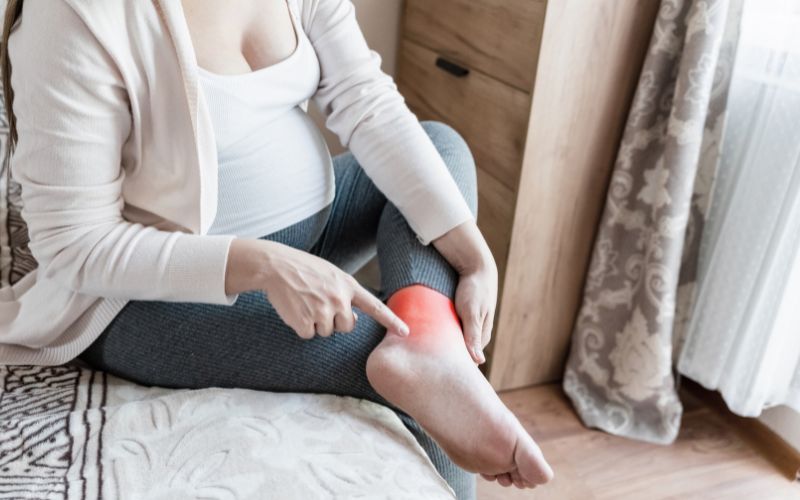Pregnancy is a beautiful journey, but it’s not without its challenges. Over the nine-month period, expectant mothers may encounter common issues such as morning sickness, stretch marks, constipation, leg cramps, and more. While these problems are typical, they can cause discomfort and stress for moms-to-be. Let’s delve into each of these common pregnancy concerns and explore ways to manage them effectively.
1. Morning Sickness
Morning sickness is an extremely common symptom during pregnancy, affecting most expectant mothers. The signs of morning sickness can vary from person to person and may include nausea, fatigue, drowsiness, constipation, headaches, changes in taste and smell preferences, and allergies.
To ease the discomfort of morning sickness, pregnant women should eat small, frequent meals and snacks, such as crackers or toasted bread, to soothe the stomach. Staying hydrated by drinking plenty of water is also essential. Additionally, it’s helpful to avoid strong-smelling foods and triggers like motion or loud noises, and to minimize stress to reduce nausea.
 Morning Sickness
Morning Sickness
For further guidance:
2. Leg Cramps
As the baby grows, it exerts pressure on the uterus and affects blood circulation in the lower half of the body, making leg cramps a common occurrence for pregnant women.
If leg cramps strike, stretch the calf muscle by straightening the leg and flexing the toes towards the body, while gently massaging the foot. Lack of exercise and deficiencies in certain nutrients like calcium, magnesium, and potassium can also contribute to leg cramps, so it’s important for expectant mothers to include calcium-rich foods in their diet and stay physically active.
 Leg Cramps
Leg Cramps
3. Anemia or Low Blood Pressure
Pregnant women are prone to anemia as the growing fetus absorbs iron from the mother’s body. To prevent anemia, it’s crucial for expectant mothers to include iron-rich foods in their diet and consider taking iron supplements under medical guidance.
Additionally, consuming foods rich in vitamin C can enhance iron absorption in the body. Anemia can lead to a reduction in blood volume and oxygen levels, causing low blood pressure and an increased risk of fainting.
 Anemia or Low Blood Pressure
Anemia or Low Blood Pressure
For more insights:
4. Stretch Marks
As the baby grows, especially during the final months of pregnancy, stretch marks become more noticeable due to the skin stretching. These marks may appear earlier if the mother’s weight gain outpaces the skin’s elasticity.
The timing and extent of stretch marks vary depending on individual factors. However, they typically start to appear during the sixth or seventh month of pregnancy. To minimize the appearance of stretch marks, pregnant women are advised to use moisturizing creams or soybean oil on their skin from the early stages of pregnancy.
 Stretch Marks
Stretch Marks
Explore more here:
5. Edema (Swelling)
In the final stages of pregnancy, expectant mothers may experience edema, particularly in the lower body and legs. This is due to increased blood volume and the pressure exerted by the growing fetus in the uterus.
To alleviate edema, gentle exercises that promote blood circulation, such as stretching and gentle walking, are recommended. Keeping the feet warm and avoiding excessive salt intake can also help. In some cases, edema may be a result of water retention, and standing for long periods can worsen the condition. Pregnant women should still aim for adequate hydration (around 2 liters of water per day) and limit their consumption of sugary drinks.
If swelling occurs in multiple body parts, along with blurred vision and nausea, it’s important to seek medical attention promptly.
 Edema (Swelling)
Edema (Swelling)
6. Constipation
Constipation is a common issue for expectant mothers, especially during the final months of pregnancy. It can lead to loss of appetite, digestive issues, and even toxicity if left unaddressed.
To alleviate constipation, pregnant women should increase their fluid intake, consume fiber-rich fruits and vegetables, and develop a regular bowel movement routine.
 Constipation
Constipation
7. Frequent Urination
As the baby grows, it puts pressure on the bladder, leading to frequent urination. This can be a source of discomfort, fatigue, and even sleep disruption for expectant mothers. Infections in the urinary tract can also contribute to this issue.
If frequent urination is accompanied by a burning sensation, pain in the lower abdomen, or other unusual symptoms, it’s important to consult a healthcare provider.
 Frequent Urination
Frequent Urination
While these seven issues are common during pregnancy and can be bothersome, they are typically manageable with the right guidance and care. Remember to seek medical advice if you experience any unusual symptoms or have concerns during your pregnancy journey.
Source: Sức khỏe và Đời sống Newspaper
Exploring the Use of Birth Control Pills for Acne Treatment
Are you curious about the advantages and disadvantages of taking daily birth control pills? Do women who take them experience better looking and feeling skin during their periods? DienmayXANH.com is here to discuss all of these questions and list all of the potential pros and cons of using birth control pills!





































